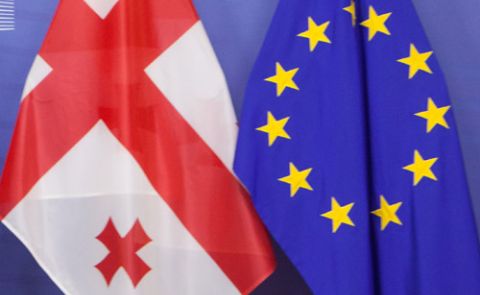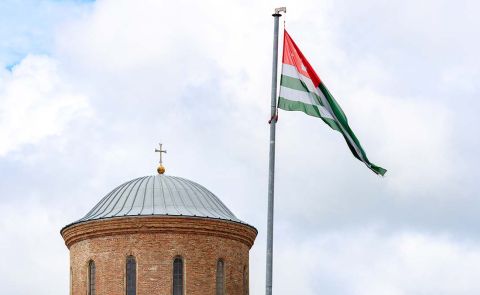
Recent developments regarding Armenia

Pashinyan meets with Luigi Di Maio, Italy's Minister of Foreign Affairs
Prime Minister Nikol Pashinyan welcomed a team led by Luigi Di Maio, the Italian Minister of Foreign Affairs and International Cooperation, who was visiting Armenia on a working visit.
Mr. Maio's visit to Armenia was also warmly greeted by Prime Minister Pashinyan, who expressed optimism that it would provide a fresh impetus to the growth and strengthening of ties between Armenia and Italy in a variety of spheres. Both bilaterally and inside the European Union, Nikol Pashinyan emphasised the necessity of working with Italy.
Luigi di Maio emphasised his country's desire to extend and improve ties with Armenia, especially economic collaboration. The Italian Minister for Foreign Affairs and International Cooperation stressed the need of taking immediate action to boost trade and undertake cooperative investment plans.
Both parties saw the expansion of collaboration in domains such as energy, information technology, education, and other disciplines as promising. The speakers also addressed matters concerning the South Caucasus crisis.
Prime Minister Pashinyan shared his thoughts on the events unfolding in the Karabakh region, emphasising the necessity for the international community to respond appropriately to Azerbaijan's aggressive actions. He emphasised the significance of a complete settlement of the Nagorno-Karabakh conflict inside the OSCE Minsk Group, highlighting the importance of defining Nagorno-Karabakh’s status, providing security, and preserving the Armenians of Karabakh’s fundamental rights.
Luigi Di Maio pledged Italy's support for the Minsk Group Co-Chairs and European Council President Charles Michel's efforts to resolve the Nagorno-Karabakh conflict and restore stability and peace to the South Caucasus. The conversation between Armenia and Turkey aimed at normalising relations was also appreciated by the Italian Minister.
Pashinyan paid tribute to the memory of the heroes of the Four-Day War
Prime Minister Nikol Pashinyan, along by Minister of Defence Suren Papikyan, paid respect to the heroes who gave their lives in the 2016 Four-Day Battle and the Artsakh liberation war at the "Yerablur" military pantheon.
The Prime Minister lay flowers at the graves of Sparapet Vazgen Sargsyan and Commander Andranik Ozanyan, both casualties of the Four-Day War.
Nikol Pashinyan paid his respects to the slain freedom fighters by laying a wreath at the memorial.
Meetings of the Deputy Foreign Minister Paruyr Hovhannisyan with several high-ranking EU officials
According to Armenian Foreign Ministry, Deputy Foreign Minister of Armenia Paruyr Hovhannisyan met with European Union high-ranking officials, including Acting Director-General of the DG NEAR Maciej Popowski, Member of the European Parliament Isabel Santos, Deputy Managing Director for Eastern Europe and Central Asia Luc Devigne, the Head of the Cabinet of the High Representative of the Union for Foreign Affairs, and Security Policy/Vice-President of the European Commission.
During the meetings, the speakers expressed their appreciation for Armenia's effective partnership with the European Union, touched on the implementation of the Comprehensive and Enhanced Partnership Agreement, discussed the overall format of the EU Eastern Partnership, the continued implementation of the EaP Economic and Investment Plan and its deriving flagship initiatives, emphasised the importance of parliamentary cooperation, and pointed out a number of issues that need to be addressed.
A variety of international and regional problems of mutual importance, as well as the present circumstances surrounding the Nagorno-Karabakh (NK) conflict, were also discussed. The importance of intensifying the NK peace process under the auspices of the OSCE Minsk Group Co-Chairmanship format was once again emphasised in this regard, and the Deputy Minister expressed his gratitude to President of the European Council Charles Michel for his ongoing efforts to resolve the most pressing humanitarian issues and create an environment conducive to peace and reconciliation.
Deputy Minister Paruyr Hovhannisyan also attended a roundtable discussion hosted by the European Policy Centre during his visit, during which the parties discussed Armenia-EU relations and partnership prospects, the current situation in Nagorno Karabakh, and the impact of recent events in Ukraine on Armenia and the EAEU region in general.
Armenia's ruling party has nominated a former deputy prime minister to run for mayor of Yerevan
Former Deputy Prime Minister Tigran Avinyan has been chosen as a candidate for Yerevan mayor by the executive board of Prime Minister Nikol Pashinyan's ruling Civil Contract party.
According to Vahagn Aleksanyan, the party's public relations coordinator, Avinyan will lead the party's electoral ticket in the next elections to the Yerevan Council of Elders (the city's legislative assembly) in 2023. Aleksanyan further stated that Avinyan has already been picked by the party's executive board for the vacant deputy mayor position.
Hrachya Sargsyan, the current mayor, assumed office on December 25, 2021, three days after Hayk Marutyan, who had been mayor since September 2018, was impeached by the Council of Elders.
Because of his differences with Prime Minister Nikol Pashinyan, Marutyan was impeached by the ruling party. Following the conflict in the Karabakh in the fall of 2020, Pashinyan and Marutyan's friendship deteriorated, and the mayor distanced himself from the Civil Contract party.
Armenia's resolution on genocide prevention was adopted by the United Nations
According to Armenia's Foreign Ministry, the United Nations Human Rights Council adopted a resolution on genocide prevention.
The resolution, which is traditionally introduced by Armenia and assesses current threats and challenges, outlines the steps that UN member states should take together to prevent genocide, recognise genocide, restore justice, compensate victims, punish perpetrators, and ensure that genocide perpetrators are held accountable.
The Resolution has widespread support, as indicated by the fact that it has co-sponsors from all five regional organisations. It addresses themes such as conflict risk assessments and prevention, the misuse of new technology, especially the dangers of distributing disinformation through social media, and the necessity to ensure universal ratification of the Convention on the Prevention and Punishment of Genocide (CPPCG).
The Resolution suggests holding a meeting under the auspices of the United Nations to commemorate the Convention's 75th anniversary. The inadmissibility of using social media as an instrument of hatred will be discussed.
See Also


BP Strengthens Presence in Azerbaijan’s Offshore Energy Sector

Netanyahu’s Letter to Aliyev: Mutual Trust, Solidarity Following Hamas Attacks, Facilitating Dialogue Between Israel and Türkiye

Azerbaijan Expands JF-17 Thunder Fighter Jet Order from 16 to 40 Units

EU Commissioner and NATO PA Warn Georgia Over Democratic Decline Amid Accession Challenges

